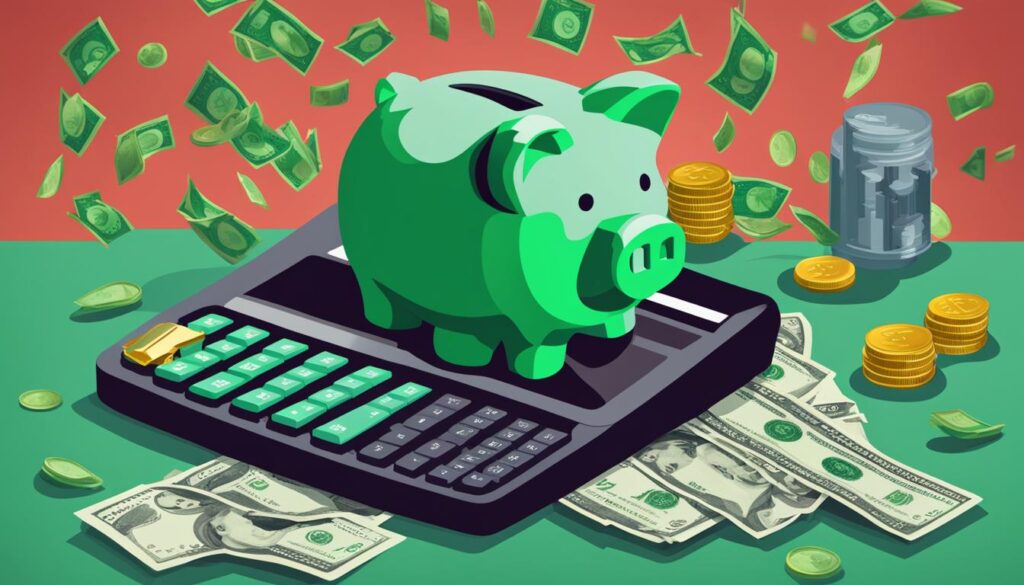Gig income management is essential for freelancers and those participating in the gig economy. According to a 2019 survey, 9 in 10 adults say nothing makes them happier or more confident than having their finances in order. This guide will provide beginners with the knowledge and strategies they need to understand, strategize, and optimize their cash flow. By mastering gig income management, freelancers can achieve income stability, develop saving strategies, and effectively track their expenses.
Key Takeaways:
- Understand the importance of gig income management for freelancers and gig economy participants.
- Achieve income stability by implementing effective strategies.
- Develop saving strategies to secure your financial future.
- Track your expenses to gain better control over your finances.
- Mastering gig income management is an ongoing process that requires adjustments as circumstances change.
Set Short-Term and Long-Term Goals for Financial Security
Setting goals is an essential step in gig income management. By establishing both short-term and long-term objectives, freelancers can create a roadmap to financial security. Short-term goals focus on immediate financial needs and can include building an emergency fund, paying off existing credit card balances, and limiting new charges. Long-term goals, on the other hand, are aspirations that require more time and planning, such as saving for retirement, a down payment on a home, or a child’s education. Having a clear vision of what you want to achieve financially will help guide your decision-making and provide a sense of direction in your financial journey.
When determining your goals, it’s important to create a financial plan that aligns with your objectives. This plan should outline the steps you need to take to reach your goals and the timeline you have in mind. It’s crucial to be realistic about what you can achieve, taking into account your current income and expenses. By breaking down your goals into manageable milestones, you can keep yourself motivated and track your progress along the way. Regularly reviewing and reassessing your goals is also important, as your circumstances and priorities may change over time.
Developing a budget is an effective way to ensure that you’re on track to meet your short-term and long-term goals. A budget helps you allocate your income towards essential costs, discretionary expenses, and savings. The 50/30/20 rule is a popular budgeting framework, where 50% of your after-tax income is designated for essential costs like housing, transportation, and utilities, 30% for discretionary expenses like dining out and entertainment, and 20% for savings and debt repayment. This rule provides a balanced approach to managing your money and allows you to prioritize saving while still enjoying your hard-earned income.
With a clearly defined set of short-term and long-term goals and a well-crafted financial plan, freelancers can take control of their finances and work towards achieving financial security. By establishing a budget that aligns with their aspirations and regularly monitoring their progress, freelancers can stay focused and make informed decisions about their spending and saving habits. Remember, setting goals is not a one-time activity; it requires ongoing commitment and adjustment as circumstances change. Stay proactive and flexible, and you’ll be well on your way to financial stability and peace of mind.
Create and Follow a Budget
A budget is a crucial tool for gig income management. It allows freelancers to track their income and expenses, identify areas where they can make adjustments, and ensure that they are on track to meet their financial goals. By creating and following a budget, freelancers can effectively manage their cash flow, prioritize essential costs, allocate funds for discretionary expenses, and save for the future.
Essential Costs
When creating a budget, it’s important to identify and prioritize essential costs. These are the necessary expenses that freelancers must cover to maintain their basic needs and sustain their work. Examples of essential costs include rent or mortgage payments, utilities, groceries, transportation, and insurance. By allocating around 50% of their after-tax income to essential costs, freelancers can ensure that they have a solid foundation for their financial stability.
Discretionary Expenses
Alongside essential costs, freelancers should also consider their discretionary expenses when creating a budget. These are the non-essential expenses that provide enjoyment or entertainment but are not crucial for survival. Examples of discretionary expenses include dining out, entertainment subscriptions, vacations, and shopping. By allocating around 30% of their after-tax income to discretionary expenses, freelancers can strike a balance between enjoying their earnings and maintaining financial discipline.
Savings
Saving for the future is an essential component of budgeting for gig income management. By prioritizing savings and allocating around 20% of their after-tax income to this category, freelancers can build an emergency fund, invest for retirement, or save for other long-term goals. It’s important to automate savings contributions and treat them as a regular expense to ensure consistency and progress towards financial security.
| Category | Allocation Percentage |
|---|---|
| Essential Costs | 50% |
| Discretionary Expenses | 30% |
| Savings | 20% |
In conclusion, creating and following a budget is an essential practice for gig income management. It allows freelancers to effectively manage their cash flow, prioritize essential costs, allocate funds for discretionary expenses, and save for the future. By establishing clear budgeting goals and diligently tracking their income and expenses, freelancers can achieve financial stability and work towards their long-term financial aspirations.

Build an Emergency Fund for Financial Stability
One of the most important aspects of gig income management is building an emergency fund. An emergency fund is a designated amount of money set aside to cover unexpected expenses or financial emergencies. It acts as a safety net, providing financial stability and peace of mind for freelancers.
When building an emergency fund, it’s essential to consider your living expenses. These expenses include rent/mortgage, utilities, groceries, transportation, and any other necessary costs for maintaining your lifestyle. By calculating your monthly living expenses, you can determine how much money you need to set aside for your emergency fund.
It’s recommended to have at least three to six months’ worth of living expenses saved in your emergency fund. This ensures that you have a substantial amount of cash reserves to rely on during unforeseen circumstances such as job loss, medical emergencies, or unexpected repairs.
Setting a specific goal for your emergency fund can help you stay motivated and consistent with your savings. You can automate your savings by setting up automatic transfers from your gig income to your emergency fund. This ensures that you consistently contribute to your fund without needing to remember to do it manually.

Conclusion
Mastering gig income management is essential for freelancers to achieve financial security and stability. By setting clear goals, creating and following a budget, building an emergency fund, and effectively managing their cash flow, freelancers can take control of their finances and optimize their earnings.
It’s important to remember that gig income management is an ongoing process and may require adjustments as circumstances change. Freelancers should regularly review and update their strategies to ensure they are on the right track towards their financial goals.
With the right mindset and strategies in place, freelancers can unlock the full potential of their freelance earnings and navigate the gig economy with confidence and success. By prioritizing gig income management, freelancers can create a solid foundation for their freelance finances and achieve the financial security they desire.
FAQ
What is gig income management?
Gig income management refers to the strategies and practices freelancers and gig economy participants use to effectively manage their income, expenses, and financial goals.
Why is gig income management important?
Gig income management is important for freelancers because it helps them achieve income stability, develop saving strategies, and effectively track their expenses, leading to financial security and peace of mind.
What are short-term goals in gig income management?
Short-term goals in gig income management can include building an emergency fund, paying off existing credit card balances, and limiting new credit card charges.
What are long-term goals in gig income management?
Long-term goals in gig income management may involve saving for retirement, a home down payment, or a child’s education.
What is the 50/30/20 rule in budgeting?
The 50/30/20 rule suggests allocating 50% of after-tax income to essential costs, 30% to discretionary expenses, and 20% to savings.
How can freelancers build an emergency fund?
Freelancers can build an emergency fund by setting a specific goal, creating an automated system for regular contributions, and saving at least three to six months’ worth of living expenses.
Why is building an emergency fund important in gig income management?
Building an emergency fund is important in gig income management because it provides freelancers with financial security and stability, allowing them to navigate unexpected expenses without relying on credit or loans.
What should freelancers do to master gig income management?
Freelancers should set clear goals, create and follow a budget, build an emergency fund, and effectively manage their cash flow to take control of their finances and optimize their earnings.
Is gig income management an ongoing process?
Yes, gig income management is an ongoing process that may require adjustments as circumstances change. Freelancers should regularly review and update their strategies and mindset to adapt to their evolving financial needs.
How can freelancers optimize their freelance earnings in the gig economy?
By mastering gig income management and implementing effective strategies, freelancers can unleash the full potential of their freelance earnings and navigate the gig economy with confidence and success.
How Does Networking Contribute to Effective Cash Flow Management in the Gig Economy?
Networking is essential for effective cash flow management in the gig economy. By connecting with others in your industry, you can gain valuable insights and opportunities for new projects. Sharing networking tips for success can help freelancers and gig workers expand their client base, find better-paying gigs, and establish long-term relationships with reliable clients. These connections not only increase income potential but also provide a support system in the unpredictable freelancing world.
What are the essential financial tools for managing gig income as a beginner?
As a beginner in the gig economy, it’s crucial to have the essential financial tools for gig economy success. These tools include budgeting apps, tax software, and expense tracking tools to manage income effectively. Additionally, setting up a separate bank account for gig earnings can streamline financial management.

